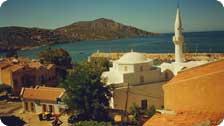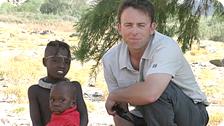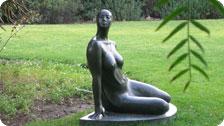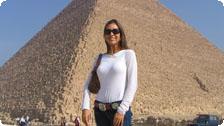Holly Payne is a novelist and screenwriter living in San Francisco. She is the author of two novels, The Virgin’s Knot and
The Sound of Blue. “The Virgin’s Knot” is the critically acclaimed story of a magically gifted Turkish woman whose faithful virgin hands create prized dowries for lucky brides, something that the weaver herself knows she can never be.
Payne’s second novel, “The Sound of Blue”, set during the Balkan conflict, chronicles the heroic journeys of three strangers who find refuge in music and each other.
Payne is on the faculty of CCA and the Academy of Art University where she teaches screenwriting and story development. She is the founder of the Skywriter Series Fiction Workshops and Skywriter Ranch, a summer fiction workshop held annually in Crested Butte, Colorado. She received an MFA from the Master of Professional Writing Program at USC. She is currently writing a third novel set in Amish country. These Pennsylvania neighbors always fascinated her growing up. To learn more, please visit Holly-Payne.com.
* * * *
Diva Visionary Questions
1. What was the best decision you made in your life?
To trade ‘security’ for adventure when I graduated from college. I was hired to be a computer programmer and analyst for the former Andersen Consulting firm, but declined to teach English in a village in Hungary, hoping to stay and find a job writing for one of the wire services in Budapest. Although I didn’t end up becoming a foreign correspondent, I ended up writing novels. That one year inspired me to write three books—two have been published and the third is a memoir that I’m terrified to write, but will one day.
2. What is your most memorable travel moment?
My family didn’t take exotic trips when I was a child. We drove to our family cabin in Pennsylvania and stopped to eat purple ice cream at a dairy farm. Aside from visiting San Francisco when I was fourteen, everything changed my senior year in high school when we went to Germany in 1989, a month after the Berlin Wall fell. On Dec. 23, the Brandenburg Gate was opened and we stood in the middle of Berlin celebrating with East and West Germans. While we helped to dismantle parts of the Wall, I interviewed people for a story for my high school newspaper and took photos. I still have a copy of the article and the chunk of the Wall in my childhood bedroom. It catalyzed my need to know more about the former Communist Bloc countries, and led me eventually to live and teach in Hungary.
And recently, when I was in Siem Reap, Cambodia, over the winter holidays, I saw a baby in the middle of the road. Trucks and tour buses were driving past him but nobody stopped. I had to speak Spanish to my Cambodian moped driver and asked him to stop by the baby. I got off the bike wondering who had put the baby there in such harm and heat. I was furious and I didn’t think my anger had anything to do with me projecting my own cultural values, although I paused to consider that before I picked up the baby. He was screaming and crying, staring, terrified of me. I didn’t know what to do. Thank god a young woman, his mother perhaps, wandered up from her hut and lifted him off the hot road, but when I got back on the moped and looked back, I saw that she had only moved him to the side of the road. I cried. It’s been six months since we met and I still see him and the fear in his eyes. I wonder what life he’ll have and I wonder if I was suppose to do more for him.
3. What was the worst travel experience you had?
I ended up with bacterial spinal meningitis while I taught in Hungary and stayed for seven days in a hospital on the Romanian border, where the road signs pointed to Bucharest. I’m not sure if the spinal tap was worse than not being able to contact anyone until I was not contagious. The doctor claimed he “could not boil the phone.” It was one of the scariest illnesses of my life. The only way to describe it in Magyar was “nagyon fucha” which means, “it’s very strange.”
4. What have you learned about yourself through traveling?
That I love this world. And I love its variety. The world has taught me a lot about generosity in others and myself. I met a mother once on a train ride to Budapest. Her son lived in Germany. I asked her if she missed him. She said, “Yes, of course I miss him. But my job was to bring him into the world and give him love, now I must let him out in the world so that it can give him character.” I’ll never forget this and I’m reminded of that every time my life becomes routine, or when I start to take it for granted.
Traveling has taught me to trust others. It has opened me up in ways that compensate for how living here in the United States has often shut me down. I have often felt safer being a woman, traveling alone, in foreign countries than I have on the streets in our country. Traveling gives me faith in people again because it’s been my experience to witness the kindness of strangers time and time again. I’ve learned that I really don’t need a whole lot to be happy, that simple pleasures, a good conversation, a stunning view, a quiet moment of introspection (often the gift of getting away) are the true luxuries. Traveling has also taught me that I really can read a map and that I really do have street smarts, and that my gut is one damn good compass!
5. If you could choose your ultimate travel companion, living or dead,
real or imaginary, who would it be?
My great great aunt Mabel Black. She died at the age of 96, after surviving a full mastectomy in the 40s. As a widow, she moved from Pennsylvania to Pasadena, California in 1946 and lived there 50 years until her death. She traveled the world by herself and took my grandmother as her guest. She also drove a convertible across the United States and put 300,000 miles on it before she sold it back to the dealer.
At least that’s the legend in my family. Aunt Mabel had a zest for adventure and she had the courage to explore the world when most women didn’t dare leave their own states. I admire her savvy and her will to survive and I’m sure she would have been a lot of fun, discussing life, and the value of taking risks.
6. What moment in your life did you feel the most alive?
The night I almost died after being struck by a drunk driver. But that’s another story.
7. If money and time were no object, where on earth would you go?
I would travel to every World Heritage Site listed under UNESCO. Then for leisure, I’d live for a year in New Zealand, then Bhutan, then return to the Mediterranean mother lode, Turkey, for a little R&R.
8. Who is your hero?
This question had me thinking for several days. It’s hard to answer because so many people have played heroic roles in my life, starting with my mother. She was the person who first recognized my love of language and encouraged me to write. I had trouble reading when I was a child and I often felt behind my brothers and my friends in school. I pretended to read the comics and get the jokes, even though all I could understand were the pictures. My mother encouraged me to read through our public library summer reading program which really got me on the track of loving books, but at a much later age, when I was nine. She said I had a way with words, and although I was not sure what that meant at the time, I trusted her and the urge I had to write poetry first. She believed in my dreams and she told me that as long as I tried my best, I would always succeed. She didn’t put a lot of pressure on me as a child. I put that on myself for reasons that still elude me.
I looked up hero again today in the dictionary. The last definition defines a hero as a person honored for outstanding qualities. To me, those qualities are people who have the courage to define their life by their passions and have the courage to honor and pursue them. I’ve always believed that our gifts lay within our passions, so it’s heroic to take the pains to unearth them if we are to share them with others, don’t you think? So, my mother remains my hero. She made many sacrifices to raise a family and yet, I think being a mother, at the time, was her passion and her gift.
9. Name a place in the world that you know a lot about and would make a
great resource for our Divas. Tell us about it.
Turkey. I dedicated five years of my life to studying the culture there and I feel I’ve only touched the tip of the iceberg. What manifested was my first novel, The Virgin’s Knot, although I am still curious and excited by the history of Central Asia and the Middle East. Another place is Laos, specifically the central capital city and World Heritage Site, Luang Prabang. It was safe, gorgeous, inspiring and relaxing.
10. And finally a word from our Featured Diva, you in your own words—give
us a stirring, Diva-worthy battle cry for women everywhere to hear!
The best affair you can ever have is the one that takes place with yourself and the world. Fall in love! Seek its mysteries, its mirrors and its magic. It is a marriage of mutual respect and adoration. Even though you might fly solo, you’ll never be alone with all the people and places that can’t wait for your arrival.













